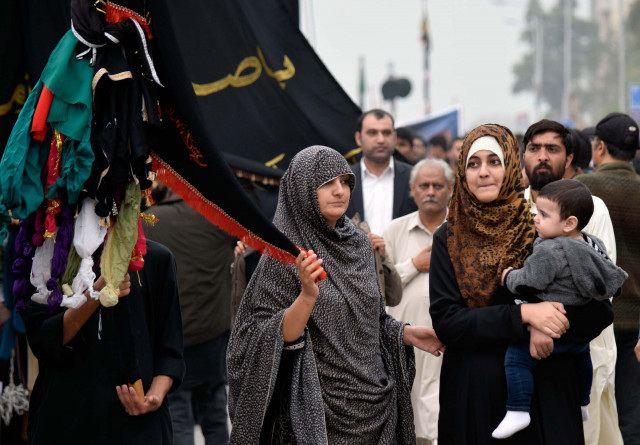A day of remembrance and prayer: Mourners come to central imambargah to get prayers answered
Women put the money in duppatas and tie the cloth around the alam, hoping to get blessings

Apart from unique cultural practices adopted in different places, most mourners who come from the twin cities and other areas to the imambargah in G-6, bring along duppatas filled with money to place them around the alam, hoping to get blessings.
These contributions, called ‘hadya’, are later used by the imambargah management to cover staff salaries and other expenses.
“This happens throughout the year, but on this particular day of Muharram, it is considered more sacred and spiritual in terms of fulfillment of their prayers,” said Nagina Manzoor, the imambargah caretaker for the last 14 years. She said that women put the money in these duppatas and tie the cloth around the alam. Apart from salaries, the money is also spent on food, tea and other refreshments for mourners.
“The duppattas are also sold later and that money is spent on salaries and food,” she said.
Nagina, 42, and her husband has been performing security duties inside the mosque for the last 14 years. The couple has no children, something that she still prays for “I am in pieces inside when women come and tell me that their prayers [for children] were fulfilled.”
“I did not have kids and my in-laws did not let me live with them. That’s why my husband and I shifted here. We dedicated the rest of our lives to looking after the imambargah and serving the faithful,” she said.
Mrs Shabbir had come from Rawalpindi with her 12-year-old son, who is disabled and bound to a wheelchair. She said she has been visiting the imambargah for many years to pray for his recovery.
“My son can barely move, listen or hear. Every year, I come here on Muharram 9 to pray for his recovery,” she said.
“After I started praying, he started moving his hands,” she said, as her son glanced over from his chair.
Published in The Express Tribune, November 4th, 2014.



















COMMENTS
Comments are moderated and generally will be posted if they are on-topic and not abusive.
For more information, please see our Comments FAQ